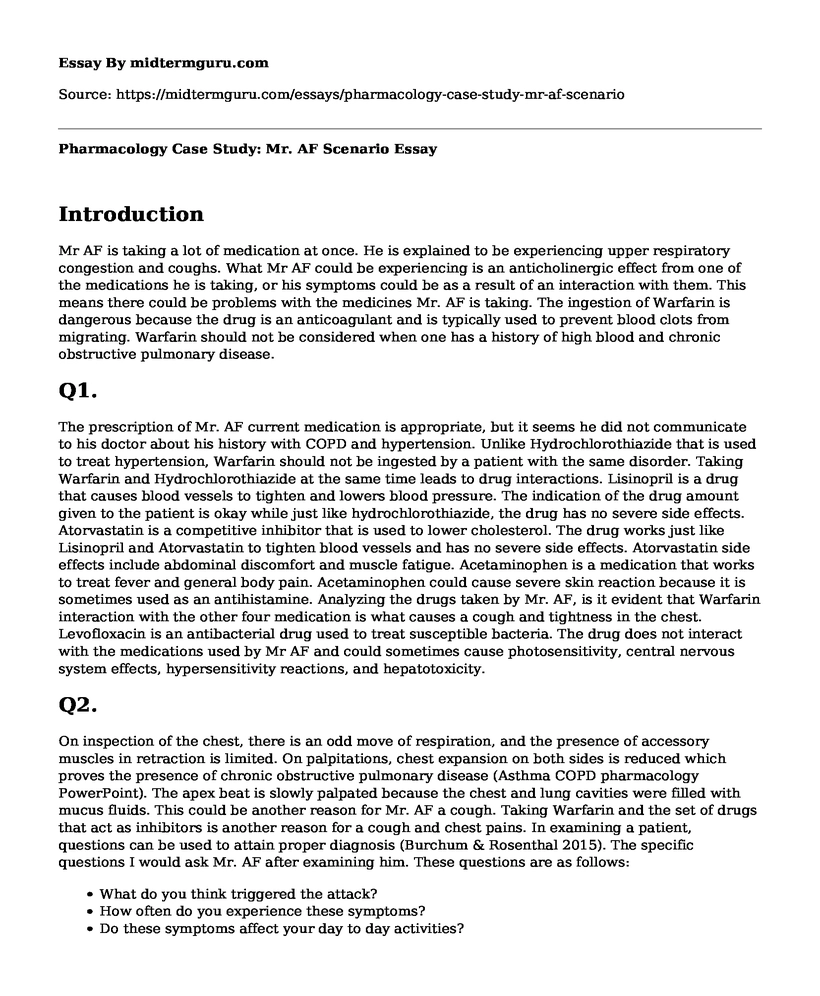Introduction
Mr AF is taking a lot of medication at once. He is explained to be experiencing upper respiratory congestion and coughs. What Mr AF could be experiencing is an anticholinergic effect from one of the medications he is taking, or his symptoms could be as a result of an interaction with them. This means there could be problems with the medicines Mr. AF is taking. The ingestion of Warfarin is dangerous because the drug is an anticoagulant and is typically used to prevent blood clots from migrating. Warfarin should not be considered when one has a history of high blood and chronic obstructive pulmonary disease.
Q1.
The prescription of Mr. AF current medication is appropriate, but it seems he did not communicate to his doctor about his history with COPD and hypertension. Unlike Hydrochlorothiazide that is used to treat hypertension, Warfarin should not be ingested by a patient with the same disorder. Taking Warfarin and Hydrochlorothiazide at the same time leads to drug interactions. Lisinopril is a drug that causes blood vessels to tighten and lowers blood pressure. The indication of the drug amount given to the patient is okay while just like hydrochlorothiazide, the drug has no severe side effects. Atorvastatin is a competitive inhibitor that is used to lower cholesterol. The drug works just like Lisinopril and Atorvastatin to tighten blood vessels and has no severe side effects. Atorvastatin side effects include abdominal discomfort and muscle fatigue. Acetaminophen is a medication that works to treat fever and general body pain. Acetaminophen could cause severe skin reaction because it is sometimes used as an antihistamine. Analyzing the drugs taken by Mr. AF, is it evident that Warfarin interaction with the other four medication is what causes a cough and tightness in the chest. Levofloxacin is an antibacterial drug used to treat susceptible bacteria. The drug does not interact with the medications used by Mr AF and could sometimes cause photosensitivity, central nervous system effects, hypersensitivity reactions, and hepatotoxicity.
Q2.
On inspection of the chest, there is an odd move of respiration, and the presence of accessory muscles in retraction is limited. On palpitations, chest expansion on both sides is reduced which proves the presence of chronic obstructive pulmonary disease (Asthma COPD pharmacology PowerPoint). The apex beat is slowly palpated because the chest and lung cavities were filled with mucus fluids. This could be another reason for Mr. AF a cough. Taking Warfarin and the set of drugs that act as inhibitors is another reason for a cough and chest pains. In examining a patient, questions can be used to attain proper diagnosis (Burchum & Rosenthal 2015). The specific questions I would ask Mr. AF after examining him. These questions are as follows:
- What do you think triggered the attack?
- How often do you experience these symptoms?
- Do these symptoms affect your day to day activities?
- Have you been prescribed to use an inhaler before?
- Have you taken lung function studied?
Q3.
According to lab results done with the help of a chest X-ray, there were issues on the lungs that revealed the presence of COPD and problems on the chest that would suggest asthma infection. Mr AF is exposed to developing COPD and asthma due to his exposure to associated risk factors like smoking. He is a chronic smoker, and the cough shows the presence of mucoid sputum that is responsible for COPD. A hyperinflated chest shows a point of obstruction.
Q4.
Warfarin is an inhibitor drug while levofloxacin is an antibiotic. Warfarin has dangerous interactions with antibiotics, and these interactions can place you at risk of bleeding. Individuals with hypertension should not take warfarin because one serious side effect of the drug is that it causes uncontrolled levels of blood pressure.
Q5.
I would counsel Mr. AF on smoking cessation because it has been shown that smoking cessation changes the course of COPD progression into another illness and at the end associated with mortality. I would also advise Mr. AF to always provide the doctor with a complete history of his health before he could be given medication because drug reactions could also be severe.
References
Asthma COPD Pharmacology PowerPoint.
Burchum, J. & Rosenthal, L. (2015). Lehne's Pharmacology for Nursing Care. Elsevier - Health Sciences Division.
Cite this page
Pharmacology Case Study: Mr. AF Scenario. (2022, Sep 28). Retrieved from https://midtermguru.com/essays/pharmacology-case-study-mr-af-scenario
If you are the original author of this essay and no longer wish to have it published on the midtermguru.com website, please click below to request its removal:
- Essay on Social Costs and Financial Risks: Expensive End-of-Life Care
- Community Awareness on Children with Autism - Paper Example
- Research Paper on Association Between Leukemia and Chronic External Exposure to Ionizing Radiation
- Paper Example on Saudi Arabia: Eastern Region Community
- Equity, Security & Ecological Integrity: Achieving a Balanced Society - Essay Sample
- Patients at Risk: Inadequate Data Storage in Hospitals - Essay Sample
- Nursing Priorities: Ranking NAND-Approved Diagnoses - Essay Sample







